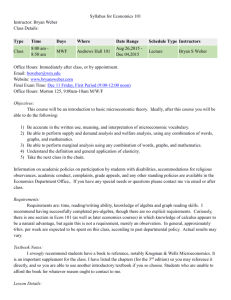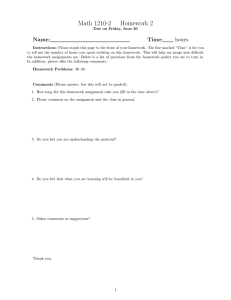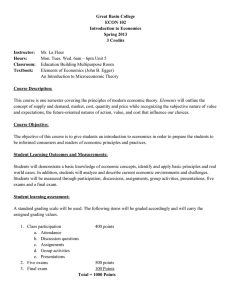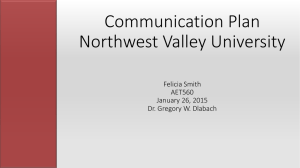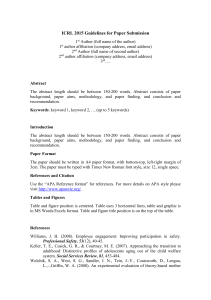Document 11744095
advertisement
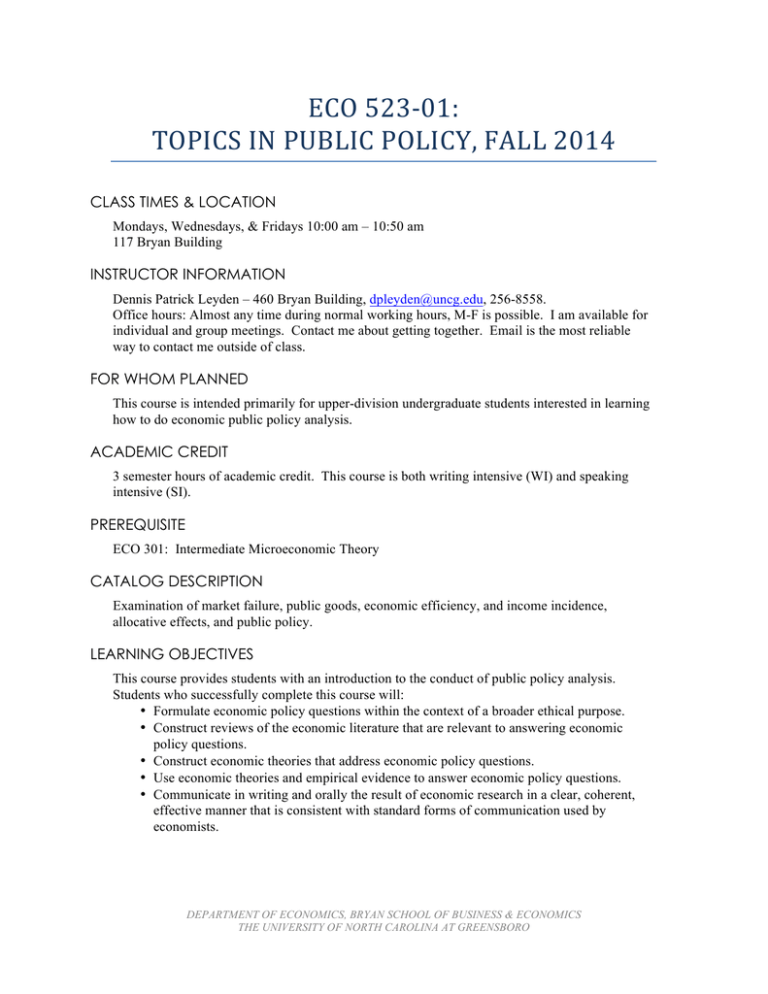
ECO 523-­‐01: TOPICS IN PUBLIC POLICY, FALL 2014 CLASS TIMES & LOCATION Mondays, Wednesdays, & Fridays 10:00 am – 10:50 am 117 Bryan Building INSTRUCTOR INFORMATION Dennis Patrick Leyden – 460 Bryan Building, dpleyden@uncg.edu, 256-8558. Office hours: Almost any time during normal working hours, M-F is possible. I am available for individual and group meetings. Contact me about getting together. Email is the most reliable way to contact me outside of class. FOR WHOM PLANNED This course is intended primarily for upper-division undergraduate students interested in learning how to do economic public policy analysis. ACADEMIC CREDIT 3 semester hours of academic credit. This course is both writing intensive (WI) and speaking intensive (SI). PREREQUISITE ECO 301: Intermediate Microeconomic Theory CATALOG DESCRIPTION Examination of market failure, public goods, economic efficiency, and income incidence, allocative effects, and public policy. LEARNING OBJECTIVES This course provides students with an introduction to the conduct of public policy analysis. Students who successfully complete this course will: • Formulate economic policy questions within the context of a broader ethical purpose. • Construct reviews of the economic literature that are relevant to answering economic policy questions. • Construct economic theories that address economic policy questions. • Use economic theories and empirical evidence to answer economic policy questions. • Communicate in writing and orally the result of economic research in a clear, coherent, effective manner that is consistent with standard forms of communication used by economists. DEPARTMENT OF ECONOMICS, BRYAN SCHOOL OF BUSINESS & ECONOMICS THE UNIVERSITY OF NORTH CAROLINA AT GREENSBORO SYLLABUS ECO 523-01: TOPICS IN PUBLIC POLICY FALL 2014 PAGE 2 READINGS & OTHER RESOURCES Required readings for this course are taken from the following books: • Leyden, Dennis P. (2012). Critical Thinking in Economics, 2nd edition. Charlotte, NC: Kona. • Sandel, Michael J. (2010). Justice: What’s the Right Thing to Do? New York: Farrar, Straus and Giroux. There are also are a number of other materials that are required for this course and that are available online or on the course Blackboard site: • Anarchy, State, and Utopia (2014). Wikipedia: The free encyclopedia. Retrieved from http://en.wikipedia.org/wiki/Anarchy,_State,_and_Utopia. • A Theory of Justice (2014). Wikipedia: The free encyclopedia. Retrieved from http://en.wikipedia.org/wiki/A_Theory_of_Justice • Broder, J. M. (2011, November 16). Re-election strategy is tied to a shift on smog. New York Times. Retrieved from http://nyti.ms/1o7IHYa • Brooks, D. (2012, April 12). Sam Spade at Starbucks. New York Times. Retrieved from http://nyti.ms/HN0Mbi • DeLong, J., Solow, R. M., Butters, G., Calfee, J., Ippolito, P., & Nisbet, R. A. (1981). Defending cost-benefit analysis: Replies to Steven Kelman. Regulation: AEI Journal on Government and Society, 5(March/April), 39-43. Retrieved from http://object.cato.org/sites/cato.org/files/serials/files/regulation/1981/3/v5n2-6.pdf • Douthat, R. (2014, February 12). Work and health insurance: Is there an alternative? New York Times. Retrieved from http://nyti.ms/Mcszrs • Gillis, J. (2012, April 30). Temperature rising: Clouds' effect on climate change is last bastion for dissenters. New York Times. Retrieved from http://nyti.ms/KrmJu8 • Gigerenzer, G. (2014, May 21). Risk savvy: How to make good decisions [Audio podcast]. Retrieved from http://www.lse.ac.uk/newsAndMedia/videoAndAudio/channels/publicLecturesAndEvent s/player.aspx?id=2460 • Gruber, J. (2011). Empirical tools of public finance [PDF document]. In Public finance and public economics (3rd edition) (pp. 63-90). New York: Worth Publishers. Available on the course Blackboard site. • Harris, G. (2012, April 2). White House and the F.D.A. often at odds. New York Times. Retrieved from http://nyti.ms/HgDDgz • Kelman, S. (1981). Cost-benefit analysis: An ethical critique. Regulation: AEI Journal on Government and Society, 5(January/February), 33-40. Retrieved from http://object.cato.org/sites/cato.org/files/serials/files/regulation/1981/1/v5n1-7.pdf • Krugman, P. (2014, June 25). On the social responsibility of wonks. New York Times. Retrieved from http://nyti.ms/1lbPooS • Lipton, E. (2014, February 9). Fight over minimum wage illustrates web of industry ties. New York Times. Retrieved from http://nyti.ms/1da7GHT • Mankiw, N. G. (2014, March 22). When the scientist is also a philosopher. New York Times. Retrieved from http://nyti.ms/1fOSiNz • Marcus, G., & Davis, E. (2014, April 6). Eight (No, nine!) problems with big data. New York Times. Retrieved from http://nyti.ms/1qdrGgZ • McWhorter, J. (2012, July 9). A matter of fashion. New York Times. Retrieved from http://opinionator.blogs.nytimes.com/2012/07/09/a-matter-of-fashion/?hp DEPARTMENT OF ECONOMICS, BRYAN SCHOOL OF BUSINESS & ECONOMICS THE UNIVERSITY OF NORTH CAROLINA AT GREENBORO SYLLABUS • • • • • • • • • • • • • ECO 523-01: TOPICS IN PUBLIC POLICY FALL 2014 PAGE 3 Metcalf, S. (2011, June 20). The liberty scam. Slate. Retrieved from http://www.slate.com/id/2297019/ Mullainathan, S. (2014, July 1). Why computers won't be replacing your just yet. New York Times. Retrieved from http://nyti.ms/1mH63kG On Liberty (2014). Wikipedia: The free encyclopedia. Retrieved from http://en.wikipedia.org/wiki/On_Liberty Pollack, A. (2012, April 12). States seek curb on patient bills for costly drugs. New York Times. Retrieved from http://nyti.ms/HEpTgJ Pollack, A. (2012, June 3). In study, drug delays worsening of breast cancer, with fewer side effects. New York Times. Retrieved from http://nyti.ms/K6bDdC Procedural Justice (2014). Wikipedia: The free encyclopedia. Retrieved from http://en.wikipedia.org/wiki/Procedural_justice Reinhardt, U. E. (2011, August 27). When value judgments masquerade as science. New York Times. Retrieved from http://nyti.ms/1l0k7K5 Reinhardt, U. E. (2012, May 11). Behind the burden of regulation. New York Times. Retrieved from http://nyti.ms/N2QhTh Roscoe, P. (2014, February 11). Economics: The enemy? (Audio podcast). London School of Economics Public Lecture. Retrieved from http://www.lse.ac.uk/newsAndMedia/videoAndAudio/channels/publicLecturesAndEvent s/player.aspx?id=2250) Shapiro, J. M. (2013, April 6). How to give an applied micro talk: Unauthoritative notes [PDF document]. Retrieved from http://faculty.chicagobooth.edu/jesse.shapiro/research/applied_micro_slides.pdf Utilitarianism (2014). Wikipedia: The free encyclopedia. Retrieved from http://en.wikipedia.org/wiki/Utilitarianism_(book) Varian, H. (2009). How to build an economic model in your spare time [PDF document]. Retrieved from http://people.ischool.berkeley.edu/~hal/Papers/how.pdf Wilkinson, W. (2011, April 15). Democracy in America: Ayn Rand on tax day. The Economist. Retrieved from http://www.economist.com/node/21017989 CONDUCT OF THE COURSE The purpose of this writing- and speaking-intensive course is to help students improve their ability to engage in independent economic policy research and communicate the results of that research in a professional manner. The structure of this course is dramatically different from a typical course. While there will be some lectures, student participation is not only required by the University by virtue of the course being a writing- and speaking-intensive course, it is absolutely crucial for success. The emphasis of the course be on in-class discussions and presentations in which students and the instructor will work together to develop economic research and communication skills. As required of all University writing- and speaking-intensive courses, this course will have both informally and formally graded writing and speaking assignments. Finally, the course will include a comprehensive final examination. Students will be provided with feedback about their writing and speaking assignments and will be expected to use such feedback to improve later writing and speaking assignments. To be successful in this course, students should study assigned material ahead of time, be willing to share their thinking and work – however incomplete – with the class, and be willing to support fellow students through both praise and criticism of their work. DEPARTMENT OF ECONOMICS, BRYAN SCHOOL OF BUSINESS & ECONOMICS THE UNIVERSITY OF NORTH CAROLINA AT GREENBORO SYLLABUS ECO 523-01: TOPICS IN PUBLIC POLICY FALL 2014 PAGE 4 FACULTY AND STUDENT GUIDELINES Each student is required to sign the Academic Integrity Policy on all major work submitted for the course. Refer to UNCG Undergraduate Bulletin/Graduate Bulletin or: • http://sa.uncg.edu/dean/ In addition, the Bryan School Faculty Assembly and the Bryan School Student Advisory Council have adopted a set of Faculty and Student Guidelines that defines expected behavior for both faculty and student. For more information about these Guidelines consult: • http://bae.uncg.edu/students-resources/ EVALUATION & GRADING Listed below are the various formally and informally graded assignments. Formally graded items are graded on a 100 point scale with each letter grade range being 10 points. Informally graded items are graded using a !± system, with a minus indicating less than satisfactory work and a plus indicating especially meritorious work. At the end of the semester, a weighted average of the formally graded items is calculated, rounded to two decimal places, and the grade converted to a letter grade with the top third of each 10-point letter-grade range being awarded a plus and the bottom third of each 10-point letter-grade range being awarded a minus. Then the informally graded items are evaluated to determine whether an adjustment in that course letter grade is warranted before assigning the final course grade. • Paper Topic Assignments • • • • • • ° Assignment 1 ......................................................................................... !± system ° Assignment 2 ........................................................................5% (formally graded) Frame of Reference Reports ° Positive .................................................................................................. !± system ° Normative .............................................................................................. !± system ° Political .................................................................................................. !± system Model-Building Reports ° Status Report (oral) ................................................................................ !± system ° Initial Model Draft ................................................................5% (formally graded) Bibliography Assignments ° Assignment 1 ......................................................................................... !± system ° Assignment 2 ........................................................................5% (formally graded) Speaking Center Consultation(s) ..................................................................... !± system Term Paper Assignments ° Status Report (oral) ................................................................................ !± system ° Complete Paper (1st Draft) ..................................................15% (formally graded) ° Presentation.........................................................................25% (formally graded) ° Complete Paper (Final Draft) .............................................30% (formally graded) Final Examination .........................................................................15% (formally graded) Informally graded assignments that are not completed will receive a zero; informal assignments that are completed after they are due will receive a zero or check-minus at the discretion of the instructor. Formally-graded written assignments that are turned in late will receive a 10-point deduction for every calendar day that they are late (measured in 24 hour increments from the due date and time). The formally-graded presentation will receive a 20-point deduction for every calendar day that it is late. Finally, there is in general no ability to reschedule the final examination; students who miss the final examination will receive a zero. The only exceptions to this policy are: DEPARTMENT OF ECONOMICS, BRYAN SCHOOL OF BUSINESS & ECONOMICS THE UNIVERSITY OF NORTH CAROLINA AT GREENBORO SYLLABUS ECO 523-01: TOPICS IN PUBLIC POLICY FALL 2014 PAGE 5 • Students with three final examinations within a 24-hour period may apply to the University Registrar's Office for permission to change their examination schedules. All requests for changes in examinations must be filed with the University Registrar's Office by 5:00 pm on Reading Day. • Students who, due to extreme circumstances that are beyond their control, cannot take the final examination at the scheduled time and date may petition to have the final examination rescheduled. In such circumstances, students should contact the instructor as soon as possible and provide tangible evidence to support the claim that there is a conflict that is due to extreme circumstances that are beyond their control. Examples of situations that are generally not justifications for rescheduling the final examination include conflicts with other courses that do not follow the prescribed final examination schedule, conflicts with work schedules, and conflicts with end-of-semester travel arrangements. ASSIGNMENTS Special note: Any additional details about assignments will be provided in class and/or on the course Blackboard site. • Paper Topic Assignments – To help develop a clearly focused paper topic, students are required to draft a paper topic and provide supporting material to explain and justify that choice (Assignment 1). Then, after further reading, discussion, and consideration of that topic, students are required to revise their paper topic and again provide supporting material to explain and justify that choice (Assignment 2). Both paper topic assignments should be typed using the template MS Word file that is provided on the course Blackboard site, should be submitted in hardcopy form, and are due at the beginning of class on the day assigned. • Frame of Reference Reports – To help develop a more solid foundation for their research, students are required to reflect on what positive, normative, and political frames of reference will be used in writing their papers. Due dates are noted in the course calendar, and all reports should be typed using the template MS Word file that is provided on the course Blackboard site, should be submitted in hardcopy form, and are due at the beginning of class on the day assigned. • Model-Building Reports – To help build a formal economic model to be used to analyze chosen topics, students are required to share their experiences building their models in oral status reports and to then provide initial typed, hardcopy descriptions of their models. Due dates are noted in the course calendar. Rubrics are provided on the course Blackboard site to provide guidance in completing these reports. • Bibliography Assignments – To aid in the development of a relevant set of references that will be useful in completing the term paper, students are required to draft an annotated bibliography, that is, a list of references along with supporting material to explain and justify that list (Assignment 1). Then, after further reading, discussion, and consideration of their paper and its needs, students are required to revise their annotated bibliography, again providing supporting material to explain and justify their choices (Assignment 2). Both annotated bibliography assignments should be typed using the template MS Word file that is provided on the course Blackboard site, should be submitted in hardcopy form, and are due at the beginning of class on the day assigned. • Speaking Center Consultations – Students are required to take part in at least one Speaking Center Consultation with the UNCG Speaking Center and provide documentation of that process by the beginning of class on the due date. Because speaking, like writing, improves DEPARTMENT OF ECONOMICS, BRYAN SCHOOL OF BUSINESS & ECONOMICS THE UNIVERSITY OF NORTH CAROLINA AT GREENBORO SYLLABUS ECO 523-01: TOPICS IN PUBLIC POLICY FALL 2014 PAGE 6 with repeated efforts and reflection, students who do more than one Speaking Center Consultation have the opportunity to earn a check-plus. • Term Paper Assignments – Students are required to research, write, present, and revise a 25003750 word paper (approximately 10-15 page double-spaced paper). Be sure to note that word count excludes the paper’s cover, abstract, references, diagrams, etc. The paper should have the structure described in class. To help in writing that term paper, students are required to share their experiences building their models in oral status reports, after which the first written draft of their papers must be submitted electronically using SafeAssign on the course Blackboard site by the date and time noted below in the course calendar and must be in the form of an MSWord file. A schedule of when each student is to present will be arranged ahead of time. Presentations based on the paper are expected to be 15 minutes long; if the length of the presentations needs to be shortened because of time constraints, students will be informed before any presentation is made. Finally, a revised, final draft of the paper based on feedback from the instructor should be submitted electronically using SafeAssign on the course Blackboard site by the date and time noted below in the course calendar. • Final Examination – The final examination will be comprehensive and will test students’ knowledge and abilities in two areas: their knowledge of previously assigned reading material, and their knowledge of their term paper and the process used in writing the paper. TOPICAL OUTLINE & CALENDAR The calendar below provides an outline of course activities along with the associated readings and assignment due dates. If the University cancels class, check the course Blackboard site for information about rescheduling. However, be sure to note that any assignment due on-line on the day the University cancels class will continue to be due as originally assigned. Date Classroom Activity Assignments (due at beginning of class unless otherwise stated) Students should review the course Blackboard site, read the syllabus, and especially read materials assigned for next time, keeping in mind these questions: • What is the purpose of policy analysis? • How is policy analysis conducted? • What are the problems with policy analysis? AUG 18 Introduction AUG 20 What is Economic Policy Analysis? • Brooks (2012, Apr 12) • Douthat (2014, Feb 12) AUG 22 A Structure for Analysis • Leyden, Ch. 1 & 2 DEPARTMENT OF ECONOMICS, BRYAN SCHOOL OF BUSINESS & ECONOMICS THE UNIVERSITY OF NORTH CAROLINA AT GREENBORO SYLLABUS AUG 25, 27 ECO 523-01: TOPICS IN PUBLIC POLICY FALL 2014 Student Research Topics Tools of the Policy Analyst -­‐ Introduction • Leyden Ch. 3 AUG 29 • Procedural Justice (2014) • Sandel Ch. 1 Tools of the Policy Analyst -­‐ Positive Perspectives • SEP 8 SEP 3, 5, 8, o Gruber (2011) 10, 12 o Marcus & Davis (2014, April 6) o Mullainathan (2014, July 1) • SEP 10 o Gigerenzer (2014, May 21) Tools of the Policy Analyst – Normative Perspectives • SEP 15 o Mankiw (2014, Mar 22) o Pollock (2012, Jun 3) o Reinhardt (2011, Aug 27) o Sandel Ch. 2 • SEP 19 o Anarchy, State, and Utopia (2014) SEP 15, 17, o Metcalf (2011) 19, 22 o On Liberty (2014) o Pollack (2012, Apr 12) o Sandel Chs. 3, 6, 8, 9 o A Theory of Justice (2014) o Utilitarianism (2014) o Wilkerson (2011) • SEP 22 o DeLong et al. (1981) o Kelman (1981) o Roscoe (2014, Feb 11) o Sandel Ch. 4 Tools of the Policy Analyst – Dealing with Politics • Broder (2011, Nov 16) • Gillis (2012, Apr 30) SEP 24 • Harris (2012, Apr 2) • Krugman (2014, Jun 25) • Lipton (2014, Feb 9) • Reinhardt (2012, May 11) PAGE 7 Paper Topic Assignment 1– AUG 25 Paper Topic Assignment 2 Positive Frame of Reference Report – SEP 15 Normative Frame of Reference Report DEPARTMENT OF ECONOMICS, BRYAN SCHOOL OF BUSINESS & ECONOMICS THE UNIVERSITY OF NORTH CAROLINA AT GREENBORO SYLLABUS ECO 523-01: TOPICS IN PUBLIC POLICY FALL 2014 PAGE 8 How to Do Research – Overview • Leyden Ch. 4 • Varian (2009) Politics Frame of Reference Report SEP 29; OCT 1, 3, 6 How to Do Research – Student Models Model Status Report (oral) – TBA OCT 8, 10, 15, 17 How to Do Research – Student Bibliographies Initial Model Draft – OCT 8 Bibliography Assignment 1 – OCT 10 Bibliography Assignment 2 – OCT 17 SEP 26 Structuring Your Paper and Presentation • Leyden Chs. 3, 5 OCT 20, 22 • McWorter (2012, Jul 9) • Shapiro (2013, Apr 6) Oct 24, 27, 29, 31; Student Research Progress NOV 3, 5, 7 Paper Status Report (oral) -­‐ TBA Speaking Center Report(s) – NOV 7 Complete Paper (1st Draft) – NOV 9 at 11:00 pm. Submit using SafeAssign. NOV 10, 12, 14, 17, Public Policy Conference 19, 21, 24; DEC 1 Paper Presentations – TBA DEC 3 Final Exam 12:00-­‐3:00 pm in 117 Bryan Building DEC 5 Complete Paper (Final Draft) due Complete Paper (Final Draft) – DEC 5 by 5:00 pm. Submit using SafeAssign. DEPARTMENT OF ECONOMICS, BRYAN SCHOOL OF BUSINESS & ECONOMICS THE UNIVERSITY OF NORTH CAROLINA AT GREENBORO
